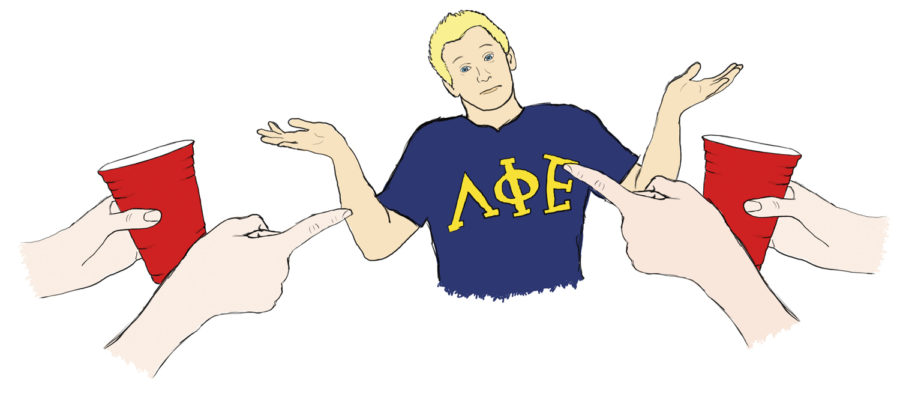I distinctly remember my first night at college, standing awkwardly in the basement of an off-campus house packed with strangers. Lost in a trance, watching drunken mobs of people make fools of themselves, I was brought back to reality when I was aggressively shoved by an incoherent stranger who spilled his drink all over me.
Just when I thought my night couldn’t get any worse, blue and red lights started flashing outside the house. It wasn’t long before the police were banging on the door. The lights went out, I lost my friends, and the guy next to me started threatening everyone to stay where they were.
It was at that moment I decided I had to join Greek life at Pitt. College is an environment known for heavy alcohol use and sex that’s all too often nonconsensual — and I didn’t want to go to parties where there were no limits on drinking or enforcement of appropriate behavior. I wanted a social life, but within a certain parameter.
The reasons I originally decided to join my sorority came to mind again last month, when an incident involving alcohol at an event for the Pitt chapter of Sigma Chi led to a pledge’s hospitalization. Even though the incident didn’t involve any other fraternity or sorority, the entire Greek community suffered for one chapter’s mistake when Pitt administrators put all fraternities and sororities on temporary social probation — all Greek organizations were banned from holding parties and other social events with alcohol.
Greek life already faces self-imposed limitations and some controls from University administration — many of which come from the direct supervision of living on campus. What happened last month wasn’t so much indicative of a problem with Greek life itself as it was of the excesses of college party culture — and blaming fraternities and sororities for those excesses simply isn’t productive.
For me, joining Greek life wasn’t necessarily about parties. It was about being part of an organization that embraces social life and friendship while also giving back to the community and maintaining order, rules and responsibility.
For example, most fraternities and sororities on campus require the constant presence of a number of designated sober people at events where alcohol is served. If members get out of hand, there are precautions in place to help avoid the worst possible outcome at a party.
So while social fraternities and sororities may have a reputation for partying, they aren’t allowed to act as out of control or drink as much as they want without consequences. And just because a single fraternity or sorority does something to violate the University’s code of conduct, doesn’t mean every Greek-affiliated organization is corrupt and misbehaved.
Greek life at Pitt has now been on probation for two weeks, and the fraternity directly involved continues to be on probation, even after Vice Provost and Dean of Students Kenyon Bonner announced last week that Pitt police hadn’t found any evidence to link the incident at Sigma Chi to hazing.
“The underage student voluntarily drank to excess,” according to a statement from Bonner emailed to the student body Thursday.
Concerned brothers at Sigma Chi risked the organization’s standing with the University by reporting it. Given the current social and administrative atmosphere at colleges, one that’s quick to blame the culture of Greek life for problems on campus, it’s commendable the fraternity responded relatively early on. Drinking dangerous amounts of alcohol, unfortunately, happens at college parties — associated with fraternities or not — every weekend. A situation not so different at a Penn State fraternity around this time last year resulted in the death of pledge Timothy Piazza when fraternity brothers delayed calling emergency services.
It seems every time an alcohol-related incident occurs on campus, the entirety of Greek life as an institution takes the blame as the originators and sole perpetrators of negative norms in collegiate life. But issues spotlighted in the conversation about fraternities and sororities — like binge drinking and hazing — are an unfortunate part of college culture in general. According to 2015 estimates from the National Institute on Alcohol Abuse and Alcoholism, 1,825 college students between the ages of 18 and 24 die from “alcohol-related unintentional injuries” yearly. Yet it’s the handful of deaths that occur within the bounds of Greek life on campuses that receive the most media attention.
This isn’t to say fraternities involved don’t bear responsibility for problems occurring in the Greek community. But there’s a bigger problem at stake, and Greek life isn’t the root of it — a culture of excessive drinking is. Like any other college function with alcohol present, fraternity parties can obviously sometimes get out of hand. The difference is that a party hosted by someone who has no social affiliation with the university is not going to hold back.
When a judge convicted Stanford’s Brock Turner of rape in 2016, sports teams at the school weren’t suspended from participating in games. When three Duke lacrosse players were charged with rape after bringing strippers to a party with alcohol, the team wasn’t kicked off campus. The culture of alcohol abuse and the negative consequences that come from it isn’t just restricted to Greek life.
Bonner reminded students in last Thursday’s email that the problem at Sigma Chi wasn’t anything special to Greek life.
“Alcohol emergencies can involve anyone in our community,” he cautioned.
Instead of turning to one organization to pin the blame on for all bad collegiate behavior, perhaps we should start to assess the values that are shared at universities and the overall culture of drinking at college. A look at the basis of this problem is essential if we ever want to solve it.
Ana primarily writes about culture and social issues. Write to Ana at [email protected].


